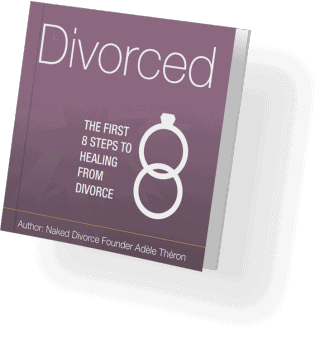
Free e-book: The First 8 Steps to healing from divorce

Are you at a crossroads in your relationship, wondering if it’s time to end your relationship? A fulfilling relationship is built on the foundations of love, commitment, and partnership. Finding that particular someone to share our goals, desires, and struggles with is something that we all strive for. The world appears to shine with the brightness of newly discovered love at first, but relationships can change unexpectedly over time. Many relationships endure hardship and the passage of time, but others come to a turning point where the question, “Is it time to end this relationship?” must be asked.
What Makes a Good Relationship?
The cornerstones of a solid, healthy relationship include good communication, mutual respect, trust, and emotional support. It’s a relationship in which both parties support one another, share happiness and sadness, and develop both separately and jointly. In a healthy relationship, each partner feels respected, safe, and understood. It’s a place where disagreements are settled by mutual consent and where love grows despite difficulties.
How Long Should a Relationship Last?
Every couple’s relationship lasts for a different amount of time. While some relationships are destined to last a lifetime, others are only meant to be in for a certain period of time. The quality of the relationship is more important than its duration. A long-lasting relationship is defined by the depth of connection, understanding, and enjoyment shared rather than just the length of time spent together.
What Typically Ends a Relationship?
Relationships can ended for a number of reasons, from external circumstances like long-distance difficulties or job shifts to differences in values, aspirations, and communication failures. Sometimes infidelity happens, trust is betrayed, or harmful behavior patterns become insurmountable barriers. It’s important to understand that a relationship ending doesn’t automatically imply failure. Occasionally, it’s the wisest choice for the happiness and personal development of both parties.
Recognizing the Signs
This in-depth guide will explore the 13 warning indicators that indicate it’s time to think about calling it quits on your relationship. These signals are important clues that the relationship you previously loved might have gotten to the point where it isn’t improving your life anymore. It’s critical to be aware of your personal wellbeing and to honestly assess your relationship. Recall that having the strength and self-compassion to let go can be an act of courage.
Let’s take a closer look at these indicators so you can decide what to do with your relationship going forward.
The Four Horsemen
One common phenomenon in the complex terrain of relationships is called “The Four Horsemen.” This idea, which is studied in great detail at the Gottman Institute, is one of the most important markers of a healthy relationship. The Four Horsemen are four bad things that can erode a relationship over time if they are present. To fully appreciate the significance of identifying these components, let’s examine each one in turn:
- Criticism: When criticism starts to dominate your relationship, it goes beyond sporadic grievances to become an unceasing barrage of negativity. It seems that neither you nor your spouse can accomplish anything that pleases the other. This kind of environment undermines one’s own self-worth and fosters a poisonous communication style in which comprehension is subordinated to blame.
- Contempt: Contempt elevates criticism to a more painful degree. It includes insults, sarcasm, derision, and an ingrained feeling of superiority. The respect that ought to be the cornerstone of any successful relationship is undermined when disdain creeps into discussions. It is characterized by a degrading mindset that might harm someone’s emotions for a long time.
- Defensiveness: In a defensive relationship, neither partner accepts accountability for their deeds or errors. Rather, they utilize justifications, retaliatory strikes, or shifting the blame to their spouse in response to criticism. This lack of accountability keeps the conflict cycle alive by impeding honest communication and problem-solving
- Stonewalling: When one or both parties emotionally distance themselves from discussions and problem-solving, it’s known as stonewalling. It’s a refusal to interact or communicate, which allows problems to fester and remain unsolved. The other partner may feel neglected and irrelevant as a result, which may cause them to feel alone in the relationship.
Arguments on Repeat
Recurrent disagreements can point to more serious underlying concerns than just the particular topics under discussion. These trends point to a communication and conflict resolution failure that may worsen with time. In order to answer these arguments, it is first necessary to acknowledge that they are a symptom of a greater problem. It’s critical to pinpoint the main issues and collaborate to develop long-term fixes. Getting outside assistance, like couples counseling, can be a great way to end the pattern of recurrent fights.
Labeling as “Too Sensitive”
When you voice your demands, being told you’re “too sensitive” can make you feel unimportant and ignored. It’s critical to acknowledge the validity of your needs and feelings. Understanding and empathy are the foundation of a healthy relationship, where both parties feel free to express themselves. If your partner keeps telling you that you’re “too sensitive,” it could indicate that they’re not ready for honest, compassionate conversation. This divide can be closed and understanding can be fostered by starting a dialogue about your emotional needs and establishing a secure environment for vulnerability.
Emotional Exhaustion
Being emotionally exhausted all the time in your relationship is a symptom that the emotional costs are becoming too great for the emotional benefits. In a good relationship, the relationship should energize and support each partner. Unhealthy imbalance develops when one partner belittles the other’s weariness or engages in emotional competition. In order to address this issue, self-care and honest communication must come first. It entails establishing an environment where both couples may express their feelings without worrying about being judged and work out strategies to help one another.
Negative Sentiment Override
It’s critical to identify when spending time together causes a spike in negative feelings as an indication that your relationship is struggling. Contented relationships should evoke feelings of happiness, security, and coziness. If feelings of guilt, shame, or rage frequently eclipse happy memories, it’s time to deal with the underlying issues. In order to identify and resolve the underlying problems that have caused this negative attitude to override, this may entail going to couples counseling.
Ignored Needs and Boundaries
Excessive disregard or dismissal of your needs and limits might cause you to feel resentful, frustrated, and emotionally distant. Both partners should make an effort to satisfy each other’s wants and respect one other’s boundaries in a good relationship. To resolve this, you and your partner must have frank discussions about what it takes for you to feel safe and loved. It’s critical to have a shared awareness of and commitment to respecting each other’s boundaries.
Lack of Empathy
It is emotionally isolating to cry and not have your partner understand and support you. It denotes a serious breakdown in the compassion and empathy that ought to be the foundation of any love relationship. It’s important to keep in mind that your feelings are real and that a caring spouse ought always be there to support and console you when things get rough. To get past this obstacle, you must talk to your partner about your emotional needs and look for opportunities to restore empathy in your partnership.
Broken Promises
Promises that are regularly broken destroy trust and encourage disillusionment. A strong relationship is built on trust, and when promises are frequently broken, it can cause feelings of betrayal and annoyance. It takes an honest discussion about commitment and follow-through to address this issue. In order to restore confidence, both parties must cooperate by keeping their promises and acting in accordance with their statements.
Trust Issues
When someone betrays trust by activities such as financial or emotional adultery, it can cause a split that is difficult to heal. Rebuilding trust is a slow process that calls for openness, responsibility, and persistent work. Rebuilding trust requires a true desire to heal the relationship expressed through actions and honest dialogue between the partners.
No Accountability
A spouse who never expresses regret or accepts responsibility for their actions can produce a poisonous dynamic in which errors remain unacknowledged and unresolved. Both partners in a good relationship should accept accountability for their actions and how they affect their spouse. Promoting open communication is essential to resolving this problem because it allows both parties to own up to their errors, extend an apology when needed, and collaborate to discover workable solutions.
Clinging to Their Narrative
When your spouse doesn’t budge from their viewpoint during arguments, it can cause a deadlock and hinder communication. Establishing an environment of understanding and compromise in a partnership is crucial. To tackle this matter, one must engage in active listening and demonstrate a readiness to consider the viewpoint of others. It is preferable for couples to look for areas of agreement and collaborate to arrive at mutually satisfactory solutions rather than being mired in their own histories.
Physical Discomfort
It is really concerning to feel physically uneasy or endangered in your partner’s presence. It is imperative that you put your safety and wellbeing first. When someone’s physical safety is in jeopardy, it’s critical to get support and assistance right away from experts, friends, or family. Never be afraid to leave a situation if you feel physically threatened.
Trust Your Instincts
If any of these indicators apply to your relationship, it might be time to consider if it’s worthwhile to keep the relationship going. Making emotional and mental health a priority need to be your main priority. It’s obvious that it’s time to think about ending the connection if maintaining the relationship will cost you your dignity, sanity, self-respect, independence, peace of mind, or health.
At Naked Divorce, we’re here to offer advice and consultations to individuals who are uncertain about the future of their partnership. Reach out to us via our website, and we’ll assist you in taking the next steps in the direction of a healthier future.
Don’t be afraid to act in your own best interests. It is never too late to put your happiness and mental health first.
If you enjoyed this post, I’d be very grateful if you’d help it spread by emailing it to a friend, or sharing it on Twitter or Facebook.
With you in service,


For a more personalized approach to your healing journey, book a free Clarity Call now. Our coaches are here to help you take your first steps towards healing. Check out our Resources or our Videos on YouTube.

